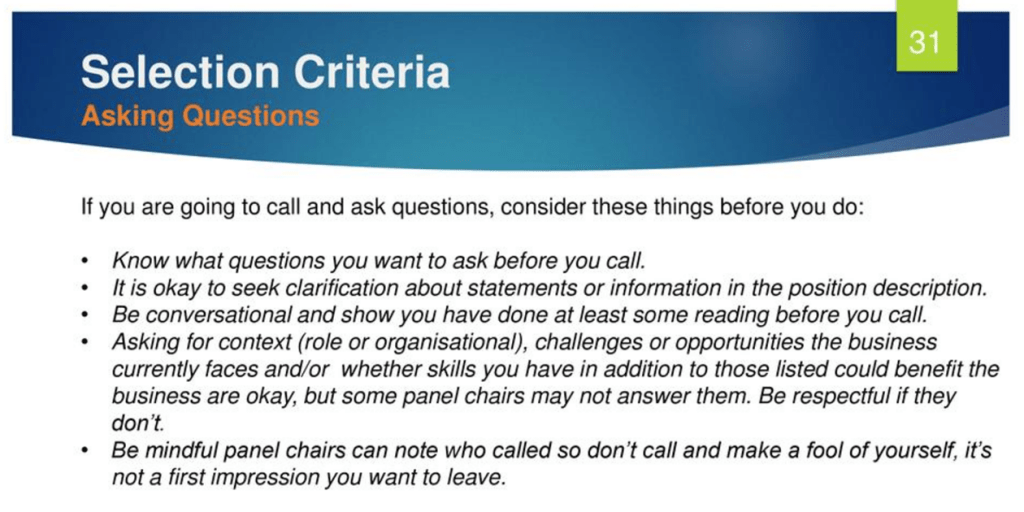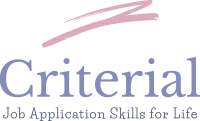This blog focusses on pre interview questions to ask hiring manager. It is the second in a series of similar themed blogs which deal with your preparation for your job application and/or job interview. The first was why your next government job application should start with a coffee. That blog dealt with why you should contact the hiring manager before you apply, including creating an opportunity to deliver an elevator pitch and create an impression before you even apply.
What are the good pre interview questions to ask hiring manager before you undertake an interview? I would argue these are also good to know before you complete your application so if you get the chance to have this conversation earlier then by all means do.
Before we get to the questions, a little context.

Why Have Questions to ask Possible Employer?
You are applying for a job which is outlined on various sheets of paper. That is quite stale, and, given how jobs change possibly a little bit out of date. Here’s things that you learn from a position description and their limits.
High Level
The position description will give you the standard Mission, Values, Accountabilities, Deliverables and Selection Criteria, which I go into in depth in ‘How To Write Selection Criteria‘ and my other online training courses.
How much can you learn about a business unit or team in two, three or maybe four pages? Not much. It is very high level and covers the range from the entire organisation down to the position.
Detail Level
If you have any work experience you know workplaces, yes even government ones, are dynamic, constantly changing, priorities change as well as come and go on a sometimes daily or weekly basis. Workplaces are also full of people, personalities, priorities, projects, and plans. That’s not a 5 P’s type list by the way, I just made them up. Suffice to say there is a lot going on. I would argue almost all of the “a lot going on” is not in the position description unless the position is being recruited against a particular project or task that is precisely specified. So, you need to have some questions to ask your potential employer.
External versus Internal Applicants
It is my opinion only, but I believe anyone from outside the workplace should be afforded as much opportunity to know about what’s going on in the workplace, as someone who works there does. Without that opportunity, you are pushing a very small pea up a very steep hill with a very small stick to be competitive. To create that level playing field you need to have questions to ask before a job interview.
Yes, arguably competencies are broad, and you can demonstrate your skills against them. Conversely, being able to show your competencies directly translate to the requirements of the role and the workplace gives you an inside advantage. If you were share trading with that much inside knowledge I would argue you would be liable for prosecution for Insider Trading (Section 1043A of the Corporations Act 2001 defines insider trading as prohibited conduct. It states that if a person (the insider) has inside information, and they know or ought reasonably to know that the information is inside information which places limits on things they must not do).
Preparation
To prepare yourself properly, and level the playing field with internal applicants, I would strongly recommend reviewing this list of pre interview questions to ask hiring manager. After all Prior Preparation Prevents Poor Performance (that is a 5 P’s quote, from James Baker, former Secretary of State).
- The business context
- Challenges
- Plans
- Scope
- Anything and everything else
Before You Begin
Before you call and start working through a list of questions to ask before a job interview, be prepared.
I talk about how to plan a call to the position contact/hiring manager in lesson 3 of my Completing Selection Criteria course – some of the lesson content shown below and you can listen here.
In brief this means have a list of questions to ask before a job interview, and, be prepared to deal with push-back.

What is Push-back?
Sometimes when you contact a hiring manager, they may feel uncomfortable because they are giving information to just one applicant, and/or they may say they cannot discuss the position for probity and fairness reasons. If that happens, it potentially derails your call before you even start. So, be prepared, after all your oral communication skills in how you pose questions to ask a potential employer could position you well before your interview.
On probity and fairness, I discuss that at length The days of government jobs for the team are gone blog. It is a reasonable and valid concern for a hiring manager to have.
If You Get A No
Be prepared to stick to your intent to find out information, don’t just walk away. I would respond by respectfully saying you understand that, and you want to represent yourself as best as possible when you apply for the role. I would add that what you are seeking is not inside or unfair levels of information, rather a level of parity of understanding of the context the role works in to inform your responses, that any internal applicant would be privy to.
What happens at this point could vary. It could be another no, or, it could be they ask to check and call you back or it could be you begin asking your questions to ask before a job interview.
If it is another no, then you have a choice to make. You can respectfully ask they seek clarification because you want to establish a level of parity of knowledge with anyone internal who may apply, or you can take the no and write the application anyway. That is your call but whatever you do, if you are going to apply, please be diplomatic and respectful. At the end of the process, if you do not get the job and you feel you were unfairly disadvantaged, then you have notes and can pursue an appeal on the basis you were not allowed to discover the information you needed in your list of questions to ask possible employers.
Politely thank them and await the call back if they say they’ll call back. If it is a yes and they take your questions, refer below. Refer to the same advice above if they say no.
If You Get A Yes
You’re now in a position to go through your list of questions to ask before a job interview, so lets look at what you should be asking.
The Questions
1. The business context
You have read the position description and know a little about the organisation, the business area, the team and the role. Reality is you still have no idea what goes on there day to day. To inform yourself I would start with asking questions based on what you know from the position description.
The Open Question
You could ask a completely open question like “Can you tell me about the business context” however that is not showing you have invested any understanding of your own. The first response to that may also be “What do you mean by the business context?” As the person asking the question it is good to give some structure around what particularly you are seeking to help the person answer your question.
The Contextual Question
I would ask the question based on what you know from your research. Be that the position description and/or some google research. The question would then sound something like “I see the aims and objectives of the section are to deliver ‘x’. As this position is responsible for managing that, I’d like to know the context around the customers, how that service came to be and something else”.
In doing this you are showing:
- You have done some research
- You’re interested
- You have good verbal communication skills
All of that is beginning to sell yourself ahead of someone even reading your application.
2. Challenges
Without being repetitive, I would not just throw out an open question like “Tell me about all the challenges you have”.
Refine your answer on what you know and what you have just heard. There may be context or history that alludes to or specifically mentions challenges. It is okay to drill into them. If you are being asked to complete a selection criterion on relationships skills, and there are significant challenges with stakeholders and relationships, you can refine your answers to those challenges.
On the unexpected side, it may be that what you hear about challenges (or context) may turn you off applying for the role altogether. That’s ok. If they job is not for you don’t be the square peg in the triangle hole.
3. Plans
Asking about plans and planning is where you move from understanding the here and now, to, the what is next.
Once again in my opinion, this is information an internal applicant would have so I believe it is fair you do too. If you get any push-back again, I would once again frame it in those terms.
You want to be posing your questions to ask your potential employer about plans for the near future and intermediate future. Are they documented and available publicly, or can you be provided a copy?
Planning becomes especially relevant as you move higher in an organisation. Managers, directors, leaders of different type live in the world of planning for what’s next and if you’re competing for a management role it is good to show those skills, and the interest in knowing.
Once again link this to what you know from research and previous answers. If the challenges are attracting staff and the future plans require staff, you know that’s going to be an immediate challenge.
4. Scope
By scope I mean the scope of the position. This is the “What are they looking for in the person” question. In the Join Selection Criteria Accountabilities to see who They Want blog I discuss how to get your own understanding from the position description. Once again, based on your knowledge you should have some sense of who they want.
This question to ask a potential employer is also about aligning yourself to the position. If the person they want is someone to lead a completely new, greenfield service development offering (which was the context of my risk taking question to the panel I discussed in How to answer “tell me about yourself” interview question) and you do not want a job like that, then you are better informed to decide whether to apply.
Similarly, if they want someone to run a well-established team for an established process that has a lot of HR issues, and you do not want a job like that, then you are knowledgeable in advance.
5. Anything and Everything Else
There are a million other things you might want to know about a job before you apply for it.
Use your imagination. There will be industry and role specific things you may want to know. Future development and on the job training may be your thing. A funky workplace culture with bean bags and pool tables may be your thing and you may want to ask about that. Spoiler alert, that doesn’t happen in government workplaces I know of.
Irrespective of whether it’s bean bags or bean counting, prepare your question as you need.
Specific Pre-Interview Questions to ask Hiring Manager
I realise to this point I have been talking in general terms about questions you could ask before you even apply or before an interview.
Specific pre interview questions to ask hiring manager would most likely relate specifically to the interview itself.
Anything you would like to know that they don’t tell you when they call or email to confirm details, make sure you ask.
- Do you know when and where to arrive?
- Do you need to check in or show ID?
- Will you have preparation time?
- What are the COVID rules in place?
- Can they accommodate equal employment opportunities principles at the interview if there are any that apply?
The object of these questions to ask potential employer is so you know as much in as much detail as possible, so you are not nervous because you don’t know things you need to.
All Questions Are Valid
It is not a common question, but I have had it before, someone asked to look at the physical work environment after their interview. That is okay, once again someone may decide the physical space is not for them and it may be a factor in their taking the job offer or not.
The Bottom Line
Whatever question(s) you ask, be polite. Be respectful. You are contacting your possible future employer and first impressions matter. Bad first impressions last, as do good ones. If you take the opportunity to show your interest, experience, communication skills and desire to present yourself as best as possible; you are showing your potential future employer those qualities which is never a bad thing.
Share this post


